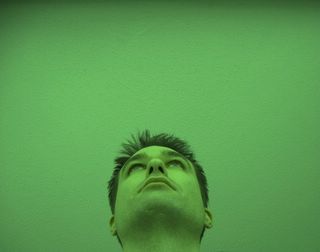Monday, December 26, 2005
This Time With Feeling
She got off the train in Fredericksburg, dragging her travel chest behind her on the platform. She let it drop after only a few yards and dabbed her lips with a handkerchief. A young man addressed her with a slight bow. She smiled behind her handkerchief and nodded. He picked up the travel chest and followed her through the depot to a waiting carriage.
Not bad, but what is she doing here? I can’t see her:
She wore an emerald green dress with lace cuffs and a tightened bodice. An exotic black hat perched on her head with peacock feathers and more lace. Deep wrinkles near her eyes, and a mouth with a sharp upturn at the corners that formed a perpetual smirk. None of us knew the color of her eyes; we found that most strange when discussing her later, but then, how often do we note the color of a person’s eyes besides those of our loved ones? Muriel was anything but loved; gossiped about, maybe. Certainly envied and begrudged and estranged, but certainly not loved. A few men had the ill-advised notion of courting her, but they were so peremptorily denied, like she was merely returning a bowl of cold soup to the kitchen with a wave of her hand, that the rest of us learned from their mistakes and kept our distance.
Okay, but why’s she hated? Where’s the atrocity, where’s the fatal flaw of character, the sullied underbelly of what’s really going on here?
She’d been married to a house builder in the neighboring town of Lux’Bourge. Her husband had gained modest wealth building homes for the land prospector, Mr. Griffin. She’d tasted just enough of the good life to covet more. She accompanied her husband to many of Mr. Griffin’s dinners, and through cunning and artifice she asserted her self to private invitations on his yacht or one of his many country homes. Mr. Griffin’s net worth was legendary amongst the townspeople’s talk at the local pub. Muriel soon disappeared into the lavish wealth provided for by Mr. Griffin.
She’d been shunned by the proper townsfolk ever since she’d left her husband. Did Muriel even notice, or care? Mr. Griffins expansive estates were like living on an island, sheltered from the chill of the outside world. Luxury was closer than love to Muriel’s heart. Trainloads of crates arrived from Turkey and France and England, antiques, clothing, jewelry for a queen.
What a bunch of bullshit. Listen to yourself, trying to sound like a writer. Tell it again, this time the plain and simple truth:
Muriel got of the train and stood by her travel chest, waiting for a gentleman to take it up for her. She wore a dress much too expensive for our town; it immediately embittered the townswomen against her, and intimidated the men to a degree where none were willing to approach her. Thompson’s boy finally helped her, but we all knew what kind of a fool he was. Though the women often talked of running her out of town, I think a part them enjoyed—in fact needed—someone to despise so thoroughly. You see, Muriel had been married to a proper man in a modest house; he was a builder. They’d had two boys. Then she gave up everything, even her two boys, to become the mistress of the wealthiest man in the county: Mr. Griffin. Now, for a man like Mr. Griffin, hardly anything was said about his character. His money held him on a level from which he could not be judged. But Muriel, she was of us, so she became fair game. And game she was. What kind of woman would give up her own children, just so she could wear new dresses from Paris and have furniture shipped all the way from Turkey?
If we were still in the habit of burning witches at the stake, Muriel would have been well-done by this time. But in this day and age we only crucified the guilty with gossip and a slow burning hatred. But as in all hatreds, there was a trace of envy, and it was that envy that brought ourselves down a notch. We put up with her. We bided our time. We acquired the habit of walking around town with stones in our pockets waiting for right moment, that hidden signal that ran like a murderous instinct through the town, for the moment that called for blood.
Sunday, December 25, 2005
Haunted Farmstead
He wasn’t sure what to make of himself, given that he passed up invitations to hang out with friends so that he could rummage around in abandoned farm fields, exploring the burnt out husks of barns, silos, tool sheds. He loved to roam haunted farmsteads on moonlit nights, with a six pack of beer or a bag of weed, maybe a friend or two, but mostly alone. He enjoyed the company of ghosts best.
The farmhouse stood within a ring of fir trees, to protect it from the strong winter winds, he suspected. All that remained was a stone foundation and a fireplace. The hole of a cellar was filled with charred timbers and a refrigerator and an old moldy doll with a missing head. At the side of the house stood two rusted clothesline poles, still rigidly posed in T formation. The cord stretching between them was missing. Why did this empty space between the poles cause such a pang of loneliness? He could almost smell clothes drying in the sun, hear the snap of sheets flapping in the wind. He wanted to curl up in the grass and watch the woman hanging clothes out to dry, one hand reaching up to pinch the clothes to the line, the other fishing blindly in a dress pocket for a wooden clothespin. In the dark he walked between the poles and closed his eyes as though, if he concentrated hard enough, he could feel the brush of bed sheets against his cheek. This was how he spent his Friday nights, while his friends were out getting drunk in the parking lots of fast food restaurants, or getting laid, or at least trying to. What would he tell them when they asked what he did that night? The truth. Always the truth.
Saturday, December 24, 2005
Sunrise over Florida, Japan, South America

I’m sitting out on my Mom’s patio, in shorts, flip flops, and a black t-shirt. Warm sun reflects off my white arms and legs. My face feels hot. The breeze is nice. I listen to the metallic ping of drivers launching golf balls down the fairway of the second tee. I listen to the thud of golf balls landing on the green. Not many birds around, but sometimes the drone of a plane in the distance.
I can hardly see the laptop screen due to the sun, but does that matter? I used to write as though words formed a painting; the appearance and the order of the letters ranked high in my valuation of good writing. I think it was the purposefulness and laboriousness of typing on a typewriter that slowed me down and forced more thought into my choice of words, and subsequently, the direction of my thoughts. Now writing is a race to keep up with the internal narrator, and I pay less attention to the ascetics of the words on the screen. So it doesn't matter now if I can see the words on my laptop screen because of the sun. My fingers race across the keys like a blind person reading brail. When my fingers grow tired, I pick up one of the many books I've brought with me.
I’m really enjoying Haruki Murakami. His style of writing keeps my interest, or is it the voice of his characters? They are like the brooding eccentrics from college that you wished you knew, but you are limited to watching from a distance. Or the eccentrics we all thought we were, in that intoxicating conceit of college writers and musicians and artists. Part of his story turns to narrative with a unique perspective on the world, but I wouldn’t put him on par with Marquez, whose writing takes on the tone and magic of a South American mythology. Maybe I’m aggrandizing somebody who I haven’t read in ten years.
Murakami writes of a character that picks a few classics and reads them over and over again. Dickens, The Great Gatsby, Shakespeare; each time he reads them he discovers something new. Remember as a child reading the same favorite books repeatedly? That pleasure of repetition and returning to the same familiar place? What would my books be? The Great Gatsby, One Hundred Years of Solitude, The Tin Drum, Shipping News, Peter Pan? Who knows. My list of favorite books changes from day to day. Some books lend themselves more readily to re-reading; I think it’s their complexity, or just the sheer beauty of the way they are written, like poetry. Will Murakami become one of those for me? Maybe. I dog-ear pages I particularly enjoy as I go along, and Norwegian Wood is starting to look like origami.
Friday, December 23, 2005
Christmas 2005 in retro
December 23, 2005 —
This is my first morning at my Mom’s house. I came down to Florida for the Holidays again, but am feeling homesick. That’s a good sign. I think last year I was still feeling like I didn’t really have a home, that my apartment was more like a hotel, and that home was where my mother was. But now I’ve made my apartment quite comfortable for myself, my own little space in the city.
 My Mom’s place is cold in the morning. But once I get up and move to the sun room, I’m warmed up by the sun coming off the golfcourse. I’m trying different spots in the house to find a comfortable place to write. I think it will be here, on the down filled sofa, with the sun behind my back and turning my screen into a collage. Or maybe on the patio.
My Mom’s place is cold in the morning. But once I get up and move to the sun room, I’m warmed up by the sun coming off the golfcourse. I’m trying different spots in the house to find a comfortable place to write. I think it will be here, on the down filled sofa, with the sun behind my back and turning my screen into a collage. Or maybe on the patio.I want to be in my big leather chair by the window, listening to classical music. I want to spend the afternoon in my favorite tea shop or at Dunn Bros, with my wireless internet access. I have no internet access here from my laptop, but I can always go on my Mom’s computer. I wanted to work on my blog and my homepage, make donations to charitable organizations before the end of the year, research financial advisors, and maybe even start my match.com profile, or sign up on ancestors.com. But being banned from the internet on this laptop during the next week will be good for my writing. It eliminates distraction. I’m left here to my own devices.
So what would I write while I’m here? Do I really think I can delve into Tea House? I’m confident I can get to Stuttersville at least, and I should probably tackle The Third Hour, as it was here that the first ideas came to me, one year ago. I have a knack for waking up here at three am, and stumble down an unfamiliar darkened hallway towards the bathroom. So write something already.
……..
We slipped well past the fence, scaled the hill, and dropped down to the weedy ground with our case of beer. Drinking in an empty field with nothing but the stars and your closest friends opens up the universe, spans time even in the moment. I looked across at Rocky and Andrew with the eyes of a thirty-six year old knowing he would remember what this moment felt like. Chad was taking a piss somewhere twenty yards away and talking to us over his shoulder, something about a girl that liked him or what we should be doing. He had the most confident grin that I had ever seen. A slight gap between his two front teath. Always grinning.
I went through phases where I distanced myself from these friends and from the late night drinking. It made me strung out, depressed, like I was throwing my life away at sixteen and that I should sitting down to writing if I ever had plans to make it. Sometimes I just wanted to recover what little innocence remained inside me. I remember walking home, strung out and hung over at 9:00 AM one morning and almost crying because I wanted to be a little boy excited about going fishing with my Dad again. I just wanted to be fishing, and that I’d never touched that Jim Beam of the night before, or taken a smoke off that pot pipe, or knew everything that I had known now. But there’s no going back.
It’s too hard to pretend that you’ve never seen what you have seen. You can’t forget what it’s like to be high in the back of a Trans-am, or what it’s like putting your hand up the shirt of a girl you just met at a fast food joint. And you’d be a fool to want to go back to being that little kid on his tenspeed, right? You’d be a geek, a nerd, a dork, a loser. You just want more, friends with faster cars, girl with bigger tits and that’ll go farther.
And I met those girls and I got in those cars. The funniest thing was that the guys with the fastest cars drove the slowest. The girls with the biggest tits didn’t let you see them. But there’s always the girls that’ll go all the way on the first night, no matter if it’s in a car or a school playground or their parents basement. Shit we grew up fast. Was my crowd unusual in this?
Okay, I’m going to read for a while, then go to bed. I’ll have most of the morning to myself tomorrow. I will start writing Stuttersville. Then maybe by Monday I’ll be writing The Third Hour. I’d like that. I had dreams not unlike those I imagine for the story, though last night the dreams were more urban, the flying terror being myself, the hands that clutched the throats and choked the hotel guests my own hand.
Merry Christmas. Merry Merry Christmas. On the third night of Christmas my true love said to me: burry me in the manger. Let me smell the bales of hay, the lulling of cattle, the scurry of field mice under the door.
Monday, December 12, 2005
Riot Against Boredom
Tuesday, December 06, 2005
Fortune Cookies
Yesterday ideas came to mind out of nowhere, and left just as suddenly.
- Write a story titled “Crop Circles in Vermont”.
- Why do the pictures we like most of ourselves look least like ourselves?
- The day the clouds crashed to the ground.
- Since nothing brings back memories like a certain smell, create a device that records smells.
- A hearse slid into the ditch. Might as well bury them both with the same shovel.
- How would I handle the job if I was Tom Cruise’s PR person. That’s a tough job. I don’t want that job.
Sunday, December 04, 2005
Having the FCC Over for Dinner
I started out feeling so liberated with the anonymity of the net, but then I shared my blog and homepage with co-workers and old college friends. My mom figured out how to go from a picture blog I'd created, then to my Blogger profile, then to my Brettanicus blog, and soon I was editing past entries about reading pornstar blogs and logging the nocturnal activities of various windows in the high rise across from me. It morphed into the more conservative ideas of logging cell phone conversations and photographing odd scraps of garbage found on the sidewalks of Minneapolis. I'm amazed that my ex hasn't googled me yet; it's only a matter of time.
I guess this is why I have stuck with fiction, for the most part, but I think people have caught on that fiction is more honest than the truth.
I could start a new blog, disconnected from my current identity on the net, to regain that anonymity and kill the censor. But something stops me. Part of it is that this little space has become an extension of my home and life, and I don't want to abandon it. Sometimes a little censorship (I keep mistyping this word as "censorshit") and restraint can be a good thing. The other part is that I wish everyone could just be an open book. The more open we become, the more we discover we're not so different from everyone else. But the danger is that honesty can so easily hurt the people we care about, either directly or indirectly. Handling a pen is like handling a gun. You have to be careful who you point it at, or someone is going to get hurt.
But what am I worried about? My family and friends have gotten bored and moved on to other things. My only regular reader is Kelsye, and how easily I've fallen for her and the Lady Kio (aka The Divine Miss Dauphine). Something is very alluring about someone you only speak to across the digital divide, half a world away.
私はあなたの想像の作りごとである。
Saturday, December 03, 2005
Tea Story
I hold two dollars and seventeen cents of change inside my pants pocket, spoils from an afternoon of panhandling along the mall; why don’t I go inside for a cup of tea? I’ve been banned, that’s why, by that red faced, heartless tea merchant recently exeunt from the alley, stage left.
Okay, so I exposed myself from under the table to a couple of elderly ladies sitting at the table next to me. But that was months ago. Since then the voices have subsided, the roiling waves of my subconscious calmed to a smooth surface. But the merchant won’t let me back in for another couple of weeks. I guess I shouldn’t be too angry with him; he didn’t call the cops on me. He just tossed me out the back door to this alley, through the steel door, one way exit, no handles.
I remember going to his tea shop as a boy with my mother. She would wear a flowered dress, bring her crocheting in a large bag stuffed with motherly kinds of things; knitting needles and aspirin and throat lozenges and checkbooks, wadded up tissues used to wipe my nose. I’d get a cup of juice while my mother would get a two cup pot of dark English Breakfast, lightened with milk and sweetened with two teaspoons of sugar. She would break off small bites from her scone and feed them to me. The tea merchant was younger then, face not so red, hair thicker and body slimmer. He’d flirt with my mother, though she mostly discouraged conversation with the merchant. We were here to get away from men, I suppose, all of whom were mere reproductions from that single deplorable image of my father. At least deplorable to her standards. My standards had not yet been formed, but I knew something was not right with the man that lived in our house, whom my mother discouraged me from calling “dad”, instead referring to him by his first name always: Chester. Chester was not the head of the household. Chester was not her husband or my father. Chester was a boarder in the attic, sleeping on an old army cot.
What was so bad about Chester? Beside the outbursts of profanity, the nervous ticks that would fling dishes or silverware from table to floor? I don’t think the primary reason was his stink: he was afraid of water, afraid of drowning, which he did one day in three and a half inches of bathwater, an accident for which my mother was acquitted. What really bothered her I suppose were his poems, written with charcoal on the walls of our cellar. Poems she would whitewash away each Sunday morning, but which would appear again throughout the week; different poems, magnificent, brilliant, rare glimpses at the colorful expanses of Chester’s fractured mind. She was afraid of it, perhaps, angered that the emotions and beauty remained either locked in his mind or confined to the cellar. Or maybe she hated that Chester’s poems were better than hers. I remember her poems only faintly, as they were quite forgettable; I only remember the flowery bindings of the vanity presses, the booklets that took much of her money to have printed for herself and relatives, signed in sprawling loops and squiggles carefully practiced. My mother, lover of tea, offender of bad poetry, guilty of neglect and cruelty towards her Tourette’s ridden husband referred to not as sweetheart or father or husband, but only as Chester.
Wednesday, November 30, 2005
Tea House
Some houses retain a transcript of the souls that had passed beneath their roofs, holding the lives of the people they had sheltered. This home had passed from a wealthy railroad family, to a city developer, then turned into a hotel, a flophouse, then several years abandoned until George bought it for a dime, fixed it up, turned it into a tea shop, returned now to a glimmer of its earlier grandeur. The clink of teacups on saucers has replaced the clink of chains as ghosts passed down the upstairs hall, listlessly searching for a lost loved one, a light in these gray hallways, a warmth in the master bedroom as though from a fire roaring in a fireplace.
George waves me over to the fire. Sit down. Have a cup of Earl Gray White Tip and a scone. Tell me why you’re still here. I thought you would be moving along to New York months ago. Been writing? Or still chasing girls around main street? You know you’re gonna get in trouble one of these days, fall in love, have a house, a family, and then you might as well say goodbye to that typewriter. The rest of your story has been told once the cry of a baby breaks the silence of your home. Then there’s a whole new dream. And it’s a good one, filled with love and pride and that all-powerful word “family”. But it’s not writing now; let’s not fool ourselves. You and me, we’re different types. We like the solitary book on a November evening. We like the rhythm of prose in the morning over a cup of tea and a quiet song playing in the other room. Each day passed alone until a friend stops by to say hello. Now, have another cup. Forget about everything that has passed these past couple of months. You’re home now.
Sunday, November 27, 2005
JM Barrie
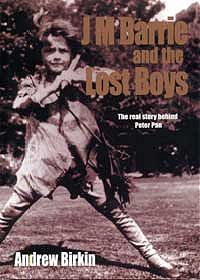 Today I finished reading the biography “JM Barrie and the Lost Boys,” by Andrew Birkin. I think I’ve been reading it for about a year. It’s been an important and comforting book for me, one which I almost didn’t want to finish, and now that I have, perhaps can attributed to my melancholy mood all day.
Today I finished reading the biography “JM Barrie and the Lost Boys,” by Andrew Birkin. I think I’ve been reading it for about a year. It’s been an important and comforting book for me, one which I almost didn’t want to finish, and now that I have, perhaps can attributed to my melancholy mood all day.But what has it meant? Why have I connected with it?
Number one, I loved reading Peter Pan, and am in awe of its endurance as a story, its tradition, and the effect it has had on children over the years. Its theme is a powerful one in my life. I too feel like a child that either won’t grow up, or can’t grow up. I seek throughout my ordinary existence ways in which to escape to a magical world like Neverland. So naturally I was entranced with the man that created all of this.
I find in Barrie a similar soul, a man subject to dark moods but whose life is so quickly brightened in the presence of a child. Watching them play; “They’re so innocent, it almost hurts” (p253). There is a magic within a child’s mind, which we are much the poorer for having lost in adulthood. It is my struggle in life to regain a little of that spark. We need not grow up, if we don’t want to. But we are also sacrificing so very much if we choose to remain a child. Marriage, children of our own, and family are all lost. I tried marriage. So did Barrie. Neither of us had much success at it.
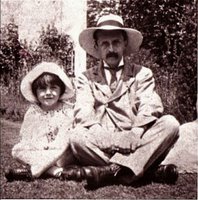 Although I’m drawing many parallels between Barrie and me, I don’t mean to say I enjoyed Birkin’s book because of these perceived parallels. I know I am no Barrie. I think I enjoyed it most because I felt like one of Barrie’s lost boys, and when I opened the book I was one of the lucky children that gathered around him and Porthos in Kensington Garden. It was less the spell of Peter Pan than that of “Uncle Jim”, cast decades later on a man who still feels like, and wants to remain, the child.
Although I’m drawing many parallels between Barrie and me, I don’t mean to say I enjoyed Birkin’s book because of these perceived parallels. I know I am no Barrie. I think I enjoyed it most because I felt like one of Barrie’s lost boys, and when I opened the book I was one of the lucky children that gathered around him and Porthos in Kensington Garden. It was less the spell of Peter Pan than that of “Uncle Jim”, cast decades later on a man who still feels like, and wants to remain, the child.So many dog-eared pages, I can jot down only a sampling of them here:
On the nature of children: “Unlike Ingley, Carroll and Wordsworth, Barrie rarely perceived children as trailing clouds of glory; he saw them as ‘gay and innocent and heartless’ creatures, inspired as much by the devil as by God. He exulted in their contradictions: their wayward appetites, their lack of morals, their conceit, their ingratitude, their cruelty, juxtaposed with gaiety, warmth, tenderness, and the sudden floods of emotion that come without warning and are as soon forgotten,” (p19).
On the actor Gerald du Maurier’s creation of Captain Hook, “Gerald was Hook; he was no dummy dressed from Simmons’ in a Clarkson wig, ranting and roaring about the stage, a grotesque figure whom the modern child finds a little comic. He was a tragic and rather ghastly creation who knew no peace, and whose soul was in torment; a dark shadow; a sinister dream; a bogey of fear who lives perpetually in the grey recesses of every small boy’s mind. All boys had their Hooks, as Barrie knew; he was the phantom who came by night and stole his way into their murky dream….And, because he had imagination and a spark of genius, Gerald made him alive,” (p110).
Two pictures of Barrie will remain with me; one, the melancholy older man who has felt “his boys” slip away from him in death or adulthood, the “Hermit of Adelphi, roosting high in his eyrie above the Thames” (p298). The other; of the magician of Kensington Gardens, creating along with five boys an inspired adventure, a fairytale bursting so suddenly into the world, like a cannon shot from the Jolly Roger.
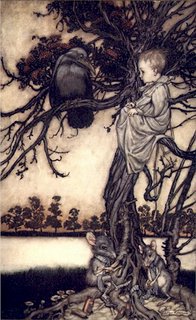
Saturday, November 26, 2005
Readers Creepers

Northern fern photo by Ingus.
He saw her come out of the coffee shop, carrying a paper cup of coffee with a little cardboard insulator like a tube top. Her books always had characters drinking tea. Looked like she lied, but isn't that what novelists do? Just because her characters drink tea, did that mean she had to drink tea? Just because her characters engaged in clandestine affairs, did she? Maybe. He quickened his pace to catch up to her.
"Nicole? Nicole Lanser?”
She slowed her pace, looked sideways at him suspiciously. "Yes?"
"I'm reading your latest book. I thought I recognized you from the picture on the back."
"There wasn't a picture on that one."
"Oh yeah, that's right. I know where I recognized you from. It was that article in the Star Tribune about you."
"Oh yes. I liked that picture. There's not many pictures of me that I like, but the photographer on that day caught one of the few." She took a sip of coffee. "Can I help you with something?"
"Oh no," he said. "I just wanted to say hi. And that I like your book. There's some parts I'd like to talk with you about, though. Could I maybe buy you a cup of coffee or something?"
She stopped walking, smirked and held up her paper cup. "I kind of already have one."
"Oh yeah, of course. Well maybe we could--"
"I'm sorry, but I was really headed home." She winced, realizing her mistake.
"Maybe I could walk you home! You live around here? I mean, I know the article said you lived in South Minneapolis, but I didn't know we lived so close to each other."
"I'm not really comfortable with--"
"I knew Owen," he said, and started walking.
She followed to catch up. "Pardon?"
"I traveled around with Owen in '95. Just after you broke up."
"But nobody knew we were going out."
"I did." His brow furrowed, eyes staring hard into the sidewalk as he walked slowly ahead.
"How is he? Does he still write? I've been trying to find him on the internet, but..."
"I don't know how he is." His dark eyes suddenly brightened, and a big fake smile spread on his face. "But I didn't come here to talk about Owen. Got any tea in the house?"
Nicole noticed he turned at the correct corner towards her house. "Coffee?"
"I thought so." He walked to her house, Nicole in tow.
Nicole's living room was decorated as vividly as her books. Dark red walls, a pressed-tin ceiling painted black. Fern bursting green in a bright bay window. Dark wood molding. Shelves of books tattered and worn, bought not for ambience but for reading, tearing into with a writer’s eyes, from which to learn, emulate, pilfer. She handed him a steaming cup of black Columbian. He took a sip, then understood why she went out for coffee.
"Where's your Underwood? I thought you wrote in front of the bay window on an Underwood, at an antique school desk"
"I actually write on a Mac upstairs. Fabrication for the reporter. Sounds a lot more romantic."
"Sells more books."
"Exactly."
"Owen was writing while we traveled. I did the driving most of the time. He wrote in a notepad. First it was love poems. There's nothing I hate more than unrequited love poems. Then we got into Mississippi, Tennessee, Louisiana. Drove mostly at night. Slept in the car in parking lots during the day."
“Why drive only at night?” she asked.
“Owen didn’t like traveling during the day. He wouldn’t say why. It was like he didn’t want to be recognized, like he was running away from something.”
“From me.”
“Probably.” He set the horrid cup of coffee on the end table and got up, browsed through the room, reading book titles, looking at artwork and photographs hanging on the walls, but really wondering what corner of the house he would find her bedroom.
“What are you laughing at?” she asked.
“Nothing,” he replied. He already knew where it was. Just like he knew what city to find her in, just like he new where she lived, just like he knew where she could find Owen, and it wouldn’t be on the internet.
Monday, November 21, 2005
Balanced Account
Friday, November 18, 2005
Pandora's Shed

Tom poured himself a cup of strong black coffee into a mug with the oversized handle for his thick fingers. He slipped his feet into flip flops, opened the sliding door of the deck, and took his first deep breath of morning air. At his cabin in northern Minnesota, the air was crisp and clean. He was located in a bend where the river widened out and the current slowed to a crawl. His girls were already leaping off the swimming dock into the water, then pulling themselves out on the stepladder, long hair streaming over their brown backs. Dodger, his six year old yellow lab, barked at them from the shore. The dog was afraid of the water, ever since he had been a puppy and had fallen off the boat.
Work flashed through Tom’s mind for a split second, an all-hands meeting to discuss the regional sales crisis in the Southwest, but work disappeared with the sound of a loon call out near Lawton’s Bay. “Girls, where’d your mother go?” he called out. But they were gone. Perhaps under the water, or hiding from him under the floating dock, giggling. He looked along the shoreline for his wife, but she wasn’t there. He would have felt completely abandoned, if it weren’t for Dodger, padding slowly along the shoreline, sniffing at the sand and river weeds for dead things.
“Dodger, where’d they all go?” The dog lifted his silver muzzle and turned to him, brown eyes returning the question.
The undisturbed slow curl of the river came around the bend and disappeared into the channel. He took another sip of coffee and pulled up a chair along the bank. He slipped off his flip flops and dug his toes into the sand. He scratched his thickly stubbled jaw and squinted to the far shore. The Emmersons waved as they loaded up their cruiser and turned on the motor. Low rumbled of their inboard, a small puff of blue smoke that would smell like oil. He waved back.
Tom was in his mid-forties, thick dark hair with a slight wave to it, graying around the sideburns. His forearms were thick but he rarely exercised or did manual labor, besides landscaping his yard back in Lakeville. Must have been genetics, he surmised, thanking his father. He wore long kaki colored shorts with large pockets that snapped closed, and an old green tee shirt, the print on the front peeling away, little holes in the short sleeves and frayed at the bottom.
Where did those girls go, he wondered, but knew it was unlikely that two girls would drown in the same moment. Just playing one of those tricks kids always like to play on adults. Kristen and Ashley, sixteen and thirteen. The older with long auburn hair, the younger as blond as her mother, curly hair bobbed short, a nose always sunburned and speckled with freckles.
His coffee had grown lukewarm. He couldn’t stand coffee any other temperature but scalding. He set the mug down in the sand and cross his legs, stretched in the warmth of the sun. Behind him his cabin sprawled, multiple levels climbing from the river-view up into the cover of the woods. He’d inherited the entire island, but this cabin was of his own making. Through the several paths worn by raccoons and the odd black bear, they could make their way to the original cottage on the other side of the island, a small but picturesque structure of mortared stones nestled on the highest point of the island. It’s rotting cedar shingled roof was smothered by towering pines. Brambles and wildberry pressed in upon it’s walls. This was just the way Tom and his wife Eileen wanted to keep it. They’d converted it into her yoga studio, where she could stretch her matt out upon the wide plank floorboards. A leaded window looked through a break in the trees to the channel.
This was the original cabin of his Uncle Will. Uncle Will had been one of those tireless workers, constantly shoveling and pruning and wheelbarrowing down in the gardens and fountains that stretched down to the water. He brought back from the city by boat the stone statues of monks and Greek maidens, fountains and benches, hummingbird feeders and bags of tulip bulbs. Now the garden ran rampant. Tadpoles hatched in the fountain, overrun with algae. It was a ghost garden from which his uncle watched him, stretched out idly on the beach, with disdain.
Fuck him, Tom cursed under his breath. His Uncle Will had always frightened him as a child, glowering at the kids running through his gardens. And there was that tool shed out back, filled with frightening things like pickled rattlesnakes and skeletons of raccoons, the plaster prints of bear claws, and the rusted blades of machetes and axes and saws. It stunk in there of oil and gasoline and sweat. It was Uncle Will’s bloody chamber, he supposed, where he would hide away from his wife, from the rest of the family, sitting on that worn wooden stool by the workbench, his back turned to the world behind him.
“Daddy, Kirsten bloodied her toe!” Ashley said, clambering out of the trees. There they were, Kirsten hobbling behind her. “It’s nothing Dad, I just stubbed it on a root,” Kirsten replied.
“Girls, haven’t I told you not to run through the woods in just your swimsuits? You need to be wearing shoes for that kind of thing.”
They had probably been up at Will’s shed again, he thought to himself. Why are girls always drawn to Pandora’s box, he wondered. Sometimes late at night, when he couldn’t sleep and found himself walking the trails through the woods at night, he would come around the crest of the hill and see, coming from under the gap at the bottom of the shed door, a pale light glowing, as though from a lantern. He’d considered tearing down the shed, but backed down under the loud objections from his wife and girls.
He heard another splash. The girls were gone again. He started up towards the woods and the path that would lead towards the cottage, where he hoped to find Eileen. He whistled, then heard the familiar jingle of Dodger's tags as he padded behind him.
Tuesday, November 15, 2005
Insonomatopoeia
Saturday, November 12, 2005
Delpy and Gellie

© noqontrol "Lady of the Lake"
From his custodial job at the clinic, Delpy had stolen the files on Gellie. Though many of the test results remained untranslatable to a non-psychiatrist, others gave a general picture of the woman who had transfixed him with her stare.
He snuck the files into his apartment building, tucked in a bag and stuffed under his arm, as though the neighbors watched through binoculars, or surveillance systems observed him from unmarked vehicles in the street. Somebody is always watching, he knew. But do they know what they really see?
Once inside his home, he placed the files on the table scattered with photos of Gellie. Some were clipped from school yearbooks from when she was a child, others were from vacation photographs, family reunions, driver’s licenses, corporate ids. You could see it even then, he thought; if you peered closely enough into her eyes you could see a vacancy and a disillusionment that would eventually take hold.
Even amongst all of this investigative information sprawled at his feet and on the table, he knew little of who was and is Gellie. Gellie was different from who Gellie is. And she was and is different from who she will be. It didn’t matter from how many angles you viewed a subject, you could not really gain the perspective necessary to know somebody. It was like walking 360 degrees around a sculpture to try and discern what is in its middle. Is it only marble? Can you know for sure, without breaking it open?
Delpy was not a sociopath or a stalker or disgruntled ex. He was one who easily fell in love with women he didn’t know, became obsessed with ideas that fell seemingly from nowhere into his thoughts. He collected things; newspaper clippings, scraps of garbage, lint taken from dryers immediately after somebody left with their laundry; these he stored in Ziploc bags labeled with names he suspected might be their’s.
His favorite part of collecting things was to take the most ordinary and insignificant items into the isolation of his room so that he could concentrate and study them time and time again. Repetition led to illumination. Penetration beyond the ordinary. How many layers can we penetrate into the labyrinth, he wondered? It was like peeling back layers of an onion. Each brought a fresh bout of tears. The center emitted the strongest waves of repulsion, an assault on the eyes and the nose. Delpy slid off his chair to the floor. Hardwood planks, wood grain beneath fingertips, nail heads driven into creaky boards protruding ever so slightly. His fingernail picked at the nail heads as though they could be peeled away like scabs. He heard muffled voices below. A family of four, two children; one an infant that cried at night, the other a four year old that smiled at him on the stairwell. With his ear pressed up against the floor he could detect sounds from throughout the building, not just those from below. Toilets flushed, dishes clattered. The only voices clear enough to be heard were those of laughter or shouting. He heard even his own breathing, but he couldn’t tell if it was carried throughout the structure of the building or only from within his own body. He doubted his presence was substantial enough to be transmitted through the foundations of the building, like everybody else’s. That was okay; he didn’t want to be noticed.
He fell asleep on the floor and woke up with light coming through the window. He cursed himself for not sleeping in his bed; what kind of person sleeps on the floor? He heard this voice not like the faint sounds of his neighbors, but the loud declarative voice of his Grandmother. The voice of his Grandmother was heard in all of the complaints and criticism of who he has been and who he is, but never of who he will be. When he hears assurances of who he will be, it is in the voice of his mother who he had been too young to remember. A voice soft and blurry like photographs clipped from newspapers and handled too often. Who he will be is tied directly to Gellie, he believes, and it will resound with the heroism of ballads, the gallantry of epic poems, the sculptures unearthed from ruins with missing arms or legs but still celebrated for what remains. She needed to be rescued like the maiden locked in her tower, and in return she would free him like the prince transformed from the body of a frog. Only then would the voice of his Grandmother be locked away as though in a room in his building, and he would only hear her when he pressed his ear against the floorboards.
Thursday, November 10, 2005
Root Canal

Today I had a day off work because I had an abscessed tooth. I went to the dentist, showed them how if I tap the tooth next to my upper right incisor, that my body could dance around in the chair as though electrified. At least I will spend no more nights with my head compressed in a vise, my cheek throbbing, my fingers fumbling for anything inside my medicine chest to either kill the pain or quell the swelling or bring on unconsciousness.
The dental hygienists are all ex-strippers. Although their bodies have taken on that more comfortable softness of motherhood, they still assume a kind of flirtatious persona when I take the chair and they pull up beside me. Especially the one that leads me to the x-ray chair and nearly straddles me as she positions the square pieces of cardboard against my gums and aims the camera on the end of the adjustable metal arm. Today two other hygienists had gathered around and they talked about what they would order in for lunch; chicken strips or buffalo wings. One said wings just aren’t the same without the bone in it, and they giggled and flashed smiles at me and the other jibed that she “was such a boner,” and the other said “That’s Suzie for you, always likes a good bone.”
I wonder if blushing shows up on an x-ray?
I love the weight of the heavy apron they place on you to protect your lungs from the x-ray machine. I want to buy one and have it fitted to cover my entire body.
While they drilled and irrigated and rinsed, I stared up at the black shadows of dead flies in the overhead light, and switched from listening to Martha Stewart’s recipies for Fall to listening to classical music: life is best experienced with a soundtrack. It adds a sense of drama to the whine of the drill, and made me feel as though I was in “A Clockwork Orange”.
I’m all patched up but still sore, and a little tired from all the ibuprofen. I had hoped that the dentist would prescribe some Vicodin at the end of my appointment, like he gives suckers out to the children, but no such luck.
Sunday, November 06, 2005
Surgeon General's Warning
Saturday, November 05, 2005
Snake in the Garden

Yeah, okay, so he’s a pretty funny guy. If it’s one thing I’ve observed through these proceedings, it has been that humor is most often used to gloss over the most terrible presentments, the most horrific events, or the general pain and fears and anxieties of the joker. Robertson is not a good guy, if you manage to look past the smile he wears for everybody else. Behind these witty comments and good natured behavior lies a man who connived his way to his position in life, somebody who takes a sadistic satisfaction in putting other people’s flaws under the microscope, and who leads a secret life behind his post as manager of a consulting firm, father of two, volunteer of the united way and golf buddy of a doctor, city council member, bank examiner, and plumber.
You might be wondering what exactly he does in his secret life. We’re all wondering about that, right? I am perhaps the most privy to his actions that occurred over the last seven years during the cracks in his daily routines, the moments when he could easily be unaccounted for in his more public life. He took advantage of overnight stays out of town for his job, of weeks spent in Vegas and Orlando for national conferences, of half-days off work for doctor appointments. Robertson enrolled his kids in several activities and then talked his wife into taking them, so that he would have hours of time unaccounted for.
Okay, so hard evidence is lacking, but there were clues. Suspicious receipts. Scratches on his hands. Out-of-state bank accounts. Your imagination is already whirring, as is mine. But in the end everyone will line up and say, “He was the last person in the world you would expect of something like this,” or “he was always there to help when you needed him.” Not me, though. I will be the first to say that I had suspected all along. Some people just leave you feeling that way. My Aunt always told me that every garden has its snake. One day he’ll slip up, and I’ll be there to catch him.
Monday, October 31, 2005
Stalked by the Muses: Prequel
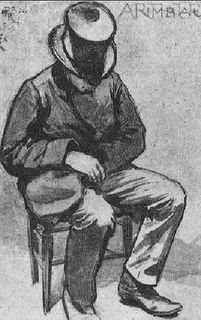
After a sleepless night I walked down a cobbled alley, through the early morning fog, toward Butler square. Across from a fountain, I found a sullied coffee shop with sidewalk tables. I sat down. I ordered a cup of tea and a scone, and sipped and nibbled at this small nourishment afforded me, and I watched the activity in the square; homeless men collecting cans, pigeons scouring the sidewalk for food, old Hmong women carting their produce to market.
He came out of the church. Or was it an opium den? Maybe a whore house? Regardless, he wore a tall black top hat, a black overcoat, and silver cufflinks pinning together the stiffly starched cuffs of garments he could have been buried in. He walked with a cane now. I wondered when that had come about.
He slowly made his way across the square, around the fountain, trailing a long extended white finger through the pools, and then came towards me. Stopping at my table, he tipped his hat. “May I join you?”
“Of course,” I said, sliding out the chair with my foot. I peered into the gaunt face of Artaud, hardly believing it was him, but knowing nobody else would visit me on this of all mornings.
He ordered a cup of coffee, black, and sipped it, the cup rattling against the saucer, as his hands shook. He never did get past the addiction, even though he denied himself the pleasure of indulgence. “I need to speak with you about your writing.”
“What writing?” I asked.
“Exactly. We’ve been waiting for you to take it up again. You left the story in mid sentence thirteen years ago.”
“We?”
He looked at me. Those black obsidian eyes, wet, glistening. “Your audience, your mentors, your influences, however you wish to name those of us who have gone before, those of us who watch with a parent’s care your every move, your every word. We send you messages, you know. I guess you don’t know; you stopped listening long ago. We speak through signs and symbols that are not typically interpreted, though you once saw them for what they were.”
I knew exactly of what he spoke, but feigned ignorance. How could I have missed the messages? But if I had missed them all, if I had turned a deaf ear or a blind eye, then perhaps that would grant me an excuse for this failure, this grand and blasphemous catastrophe for which I would become infamous in the grand gallery. My portrait held only a silhouette of a man, faintly resembling me.
Artaud began to chuckle. His laughter grew until his entire body shook and he began to cough, spilling his coffee. I peered into the splash of dark liquid in the saucer, seeing nothing less than the pools of Lethe, drawn in so that I only faintly heard his remonstrance. Was this another message?
“You have toyed with your talent like an insufferable child. We have permitted you these lapses, hoping each would give you strength of character and emotion, but you emerged without a scratch on that impenetrable conscience of yours. We have waited for growth but see that you are still but a child sucking on your pacifier, too comfortable in your swaddling clothes. What are you waiting for? You have the story, you have in Krista your audience, and she has given you the deadline of three weeks in which to deliver her something of your writing. You have excommunicated your wife from the garden, so that nothing disturbs you. As you poise yourself within the gallery, your vocal cords seize up and only a nervous stutter issues from your chest.”
“What stories are you talking about? I don’t have any.” All of my puppets lay dead at the end of their strings. The props had burned. The hall was empty.
“The Tea House. It intrigues us, it—“
“There you go again with ‘us’. Who besides you has been prying into my life?”
“You know the idols. Mr. Mojo Risin’, Rimbaud, Darger. Who do you love? Who loves you for what you could be?”
I didn’t know the answer to that. At what point did I stop worshipping? Nothing is more forsaken than a man without his idols.
I spent the morning severely admonished by Artaud until, weary, I tried to take my leave of him. But you can’t so easily outdistance a ghost, even one as lame and infirm as Artaud. In my flat, sitting at the desk and staring out the bleary window upon the street, he came out from the shadows, pulled out a chair and sat heavily with a sigh. This time, he offered encouragement, however. And somewhere, just beyond the shadows at the corners of the room, I knew the others lingered, watching, listening, urging us forward. The Tea House story, he said, so harmless, so subtle, but it represented its own oasis of idols. The tea house was another outpost on the perimeter, though less recognizable; If I would only step up.
“So why not start it? Tomorrow night, start the Tea House. Who cares if it’s good at this point. Anything would be good. You have to start again, wherever your starting point may be, to make progress to your ultimate end. And you know what that destination is. You’ve always known, even though you won’t speak of it, except in dreams.”
And with that he withdrew, quietly receding into the shadows until he was swallowed like the dregs of my tea, and alone in the quiet room I saw a blank page before me.
Friday, October 28, 2005
OK Computer
Somehow the computer connotes a nagging, almost impatient, tone in pop up windows declaring “You cannot open a version 6.0 document while running 5.6”, or “Are you sure you want to log off? Other users are logged on and you’re going to make them lose their work”. I expect any day now to see the message “You are nearly forty, shouldn’t you have children by now?” or “Your t-shirt pit stains are disgusting. A new package of Hanes Premium T-Shirts has been automatically purchased from target.com. You should receive the shipment in five to seven days.”
You have reached the end of this blog entry. Do you want to navigate away from this page? Some of the content is not secured, do you want to open this page anyway? Attachments can contain dangerous viruses, are you sure you want to open it? If not, then press the button “No, I’m scairt”, otherwise, choose “Yes, just open the F#%@ng attachment!”
Thursday, October 20, 2005
Five Months Seven Days

Gone Now
Now don’t tell me. I’m waiting here on this park bench for the surprise, and I would hate from some do-gooder like you to spoil my fun. I watch the joggers, the dog walkers, the other old guys feeding pigeons, those dirty birds crooning songs for food, and then men like me, who have connections to things unseen, waiting for the surprise. I’ve been coming here for five months and seven days; I mistakenly thought that last Thursday would be the Time, but I was too early. And the other five months? Merely a primer, strictly an evaluation period, a kind of probation. Since I’m still here, sitting on this park bench with naughty words carved into it, I’m assuming I passed. Not like Darrell, who used to sit on the memorial bench over that grassy stretch over there, you see it? The empty bench with the name on it of Douglas Farber. Mr. Farber, he owned the flophouses down Firestone Street back in the forties, even stayed in one of them myself for a time; died in eighty-seven, colon cancer. Anyway, Darrell used to sit on that bench waiting for the Time, but he wasn’t up to grade. Gone now. But I don’t think you’ll see any park benches springing up in his name around here. He’ll be in the watershed, somewhere, I imagine. I wonder if he’s fully decomposed by this point; no, weather’s been too cold this fall. No matter, he was not up to grade for the surprise, or so They must be thinking.
Now Agnes, she’s the one in the tall weeds out by bike path, looks like she’s peeing in the park again--doesn’t like public toilets, you know. Agnes is a prime candidate for the surprise; she converses with Them in the early mornings. Then around lunchtime she’s in a catatonic state, Transporting she calls it. Just lays down in the grass, eyes rolled back in her head, and doesn’t respond to nothin' for about thirty minutes. When she gets up, she’s just got this expression on her face--total relaxation, peace, love--whatever you want to call it. She says she’s guessed what the surprise is going to be, and it’s got to be something wonderful, I’m thinking. Dear woman, a far cry from when she was twelve and used to lift her skirt for our gang during recess on the playground. A number of years gone by since then; can’t say I wouldn’t like another peek, but I’ll bide my time.
You might be wondering how I got the patience to come back each day for five months and seven days now. A few reasons, I suppose. Not much else to do since I retired and my wife passed on. You’ve also got to be a man with gumption, a cause greater than yourself to serve. And of course, who don’t like a surprise? I been excited for weeks now, knowing the time’s getting closer and that I’d passed several tests already. Like the locust storm, that late summer day, grasshoppers crawling all over everything, driving most folks out of this park screaming. Not me though. And there was the Gay Pride parade. That was a tough one for me. More freakish clowns in the park that day than I thought existed in this town. Now I can tolerate a couple of fairies holding hands, but dressed up like harlots and dancing in broad daylight? I persevered, however, all for a greater cause. And that cause is today, my friends. But don’t tell me nothing. I don’t want to know what the surprise is going to be until I see it, there before me in all its glory, and my days on this bench with the naughty words is over, and I might even see Dolores again. Oh damn, hold on a sec. That wasn’t my loved one’s name. Now let me think . . .
Wednesday, October 19, 2005
Tea Lights
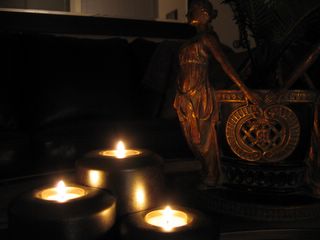
Vision in Tea Lights
We make our own sanctuary, here in a small apartment tucked away in a corner of the city. You set tea lights throughout the room, open a bottle of wine, put on some Spanish music and curl up on the sofa. I stay here, across the room, wine glass in hand, wanting to see you from a distance. Perfect moments don’t come often, and I wanted to frame it here in memory. From your face glowing there in the dark I see your eyes framing me, a content smile on your lips. I want to taste them, but a tranquility like this leaves one feeble, and I don’t have the strength to cross the room. My passing would only disturb the candlelight and shift the perfect glow reflecting off the table, the wineglass, your cheek. Better to stay here and learn to reach out with that part of myself that is beyond the body. But now the wine is drained, the music falls low, and the candles go out one by one like stars at dawn. I wonder for only a moment if sleep is claiming me now, or if it had hours earlier.
Tuesday, September 27, 2005
Lap of Luxury
Really, his help just want him out of the house so they can kick back in his luxury and enjoy the high life. The butler gets drunk on cognac in the library, and the maid dresses up in the dead wife’s evening gowns and parades about the chandeliered dining hall, entertaining an imaginary party of society’s elite. Maybe she sees the same specters as our Mr. Scorgel, only her specters laugh shrilly at the maid’s banter, and the ghost-gentlemen toast her elegance and beauty. Down in the private garage, the driver entertains the latest runaways he has transported from Loring Park in Mr. Sorgel’s Bentley. Cries and struggles muted by cinder block walls, the driver does his best to deflect the arterial spray from the tan leather seats. It doesn’t really matter. Any stains are answered for with an annoyed roll of his eyes; “Looks like Master Scorgel has spilled his cognac again.”
Now as we look upon Mr. Scorgel crouched on his bench near a bus stop, surrounded by shopping bags from Ralph Lauren, William Sonoma, Neiman Marcus, we interpret this look of utter horror in his eyes perhaps not from schizophrenic visions, but just maybe the harsh light of awareness. Maybe he knows exactly what happens back in his high-rise of iniquity.
Sunday, September 18, 2005
Killroy Lives!
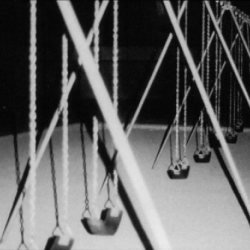
Killroy swung here.
I remember a day when I walked to elementary school with my friend David Herricks, otherwise known as “Butt”, and saw a 1950’s style Ranch house with several police cars in the driveway. A crowd of other kids on the way to school gathered at the curb across the street. An ambulance slowly pulled away, without its lights on. Coming out the front door, cops wheeled a young guy in a wheelchair, maybe eighteen years old, hands handcuffed and resting in his lap. Everybody was talking about it at school that day. Killroy, crippled on this very same playground years ago. Killed his dad with a shotgun.
A few days later the words KILLROY LIVES! was found spraypainted on the school wall. All of us kids felt a kind of liberation over the murder. In our minds it must have been a justified killing, the age-old story of a son rising up against the father, and we imagined it had been us. Years of your dad making fun of you because you’re in a wheelchair, always calling you a cripple and why couldn’t those high-bars have just killed you rather than breaking your back, and the pain and the constant taunting builds a pressure greater than the pain, the anger lifts you up and helps you pull the trigger, and that power of gunpowder and lead feels wonderful in the arms of a boy not too crippled to kill his rotten dad. And us school kids gather outside with our school bags and lunch boxes to watch him wheel down the sidewalk into a squad car, and across the yards we hear the school bells ring and we run off to class elated and exploding with excitement. Killroy lives. The guy in the wheelchair, who once swung on these bars and ran through this sandbox only to end up in a wheelchair, now raised above us all into local folklore, a legend, a myth to be spray painted on the walls of our school.
Saturday, September 03, 2005
Stalked by the Muses
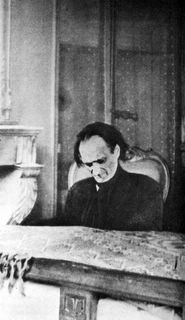
Antonin Artaud in his room, shortly before his death.
I stepped away from the window. I didn’t like the impression of being watched by my muse, on a night like this. Could there have been other muses, though, laying in wait for me, muses which I had least suspected? For years I had toyed with the idea of a very innocuous man, a kind of naïve and innocent figure in an inconspicuous job, like a park maintenance man or a janitor, carrying around in his mind the most vibrant, magical world. I hadn’t known that he was out there, in real life, mopping the floors of a nun’s dormitory, then walking the few blocks to his one room apartment in Chicago, to draw his pictures of the Vivian girls and their holy war against the men who enslaved children. Henry Darger was his name, and this private little man typed out on his manual typewriter a fifteen-thousand page novel. His neighbor thought Henry always had company over, because he could hear a din of voices coming from behind the closed doors. It wasn’t until later that he realized these were each spoken by Darger himself, speaking in different voices, like the nagging voices of nuns perhaps replayed in the stage of his room.
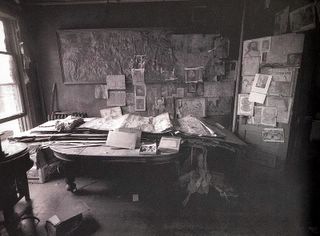
Darger's Room
Henry’s world lures me. The inviting haven of a small room that looks upon kingdoms, a tower above forests, a cave in the cliffs by the sea shores, where ghost ships slide across the horizon. Yes, this room is Darger’s, and perhaps this is the medium in which this muse seduces me. Darger’s Room. Can it be found in the smudged antique mirror above the radiator, and I might climb through? Can in be found behind the unhinged door of the clothes dryer, a little tunnel opening up upon his hardwood floors and walls of water colors depicting the great wars, the little girls sprouting wings from their backs and ram horns from their hair?
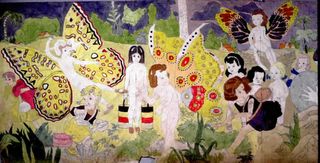
Darger Painting
I went to the kitchen, dug through the junk drawer for the box of wooden matches. I struck one on the side of the box, watched the explosion of sulfer and then the dry wooden match catch light. I lit a Mexican cocoa candle and crossed to the chair by the widow. I looked out over the night. I slid open the window. Cold night air. Rain. Flash of lightning. I climbed up on the sill, looked down for only a moment but was more transfixed by what looked like unchartered lands behind the clouds, revealed in the silver flash of lightning. Great valleys and fjords in the sky. I stepped out, some would say to my death, but others might believe I stepped out to my life. This was Darger’s Room, after all, where anything could happen. I became a great dragon writhing across the skies, frightening children that gathered by their bedroom windows in the dark, who thought they would only see lightning in the sky. I entwined my tail around the hidden moon to anchor me in these storm winds. I breathed fire down into the alleys where Artaud crept, scared him out of hiding like a mouse from the brambles. Can a ghost fear death? In Darger’s Room, perhaps. But I wasn’t sure if that scream coming from the room was Artaud’s, or just another voice of Darger’s din.
See here, Artaud, you’re not going to suck me in again. Darger’s Room doesn’t exist. All I want to do tonight is watch a movie. Your thunderstorm outside is just a distraction; this “dark and stormy night” will not lull me into the dream, this candle’s perfume will not intoxicate me.
And there he stood, in the darkened hallway, a figure in black, a ghostly face, black pools of eyes, his hands stuffed into his pockets, thankfully, for I don’t think I could handle it if I saw those pallid claws. By his heaving chest and purple smirk upon his lips, I could tell he was laughing, silently. Did Darger steal his voice?
“No, a real artist never loses their voice, at least not completely,” Artaud said. His voice reverbrated throughout the room, deep like a base cord struck in a cloister. “That is what I hope to show you, for you have forgotten you’re an artist.”
Christ, would he ever let up? I sat back in the chair and rolled my eyes. When did the laptop settle across my thighs? The heat of it emanated like a coal, the warm glow of the LCD screen on my face. The keys were so tempting beneath my finger tips, but I new what kind of struggle awaited me if I even began to tap out letters forming words forming sentences that lead one astray, that circled round on each other until you found yourself lost in one of Borge’s labyrinths.
“I don’t know what to write,” I said. I had not been able to mask the childlike fear in my voice.
“Remember the days when you were still just a teenager, and you would stay up until the early morning, laboring away at a single paragraph? You never wasted words then; you wrote as though a man starting out on a trek across a desert conserves his water. You’ll know what to write if you just quiet your heart and mind and listen.”
“Listen?”
“Yes, to the silence.”
“And hear what, Darger’s voices?”
“Perhaps,” Artaud answered, and receaded back into the darkness of the hall, and with a discrete bow, was gone.
Silence, I thought. Would I ever slow down this pounding heart, ever quiet this unraveling mind? I closed the the laptop, heard the hard drive shut down, heard the miniature heating fan slow to a halt, and then the sudden pervasive silence. Satisfied that I had exorcised my muses for the evenings, I withdrew to my bedroom, drew back the blankets, slid off my clothes and slid into the cool sheets and a night of dreams I would hopefully forget by morning.
Monday, August 29, 2005
The Power of Television
Such wondrous light pours through dusty panes of sliding glass; praise be the morning sun, and the million beams of refracted light once it passes through his glass eyeballs into the cave of his skull. He wants to boogey in this wonderland, but can’t find the remote to turn on the stereo. He supposed there was, perhaps, a button directly on the contraption, but he feared approaching too closely to the mechanism, for he saw in its face the same tattoo as that on the box of Sayten: Sony. Sony be the name of the evil one’s dominions, and knowing thy enemy’s name is the first step towards defeating them.
He cried out in agony. This light pierces the membrane of my mind; I cannot take it much longer, for he had watched television in a darkened room for so long that his eyes could not adjust to direct sunlight. He throws himself into a closet and slams shut the door.
Now let us consider the predicament of this man. Driven by his crude animal instincts to wile away the hours of his life, his true conflict arises from that trace of nobility in his blood, that desire to rise up above his nature and strive for some future goal, glimmering on the horizon of the evening like some holy grail. But is it his base instincts, or this trace of aspiration that drives him to misery? Would it not perhaps grant him the greatest peace to snuff that last remaining spark that glimmers in his breast, and permit him the leisure of living his remaining days in simple distraction, guilt free?
He weeps, collapsed there at the foot of the closet, in the draping cloth of dress shirts and garment bags, resting on the mounds of Rockport and Nike and Addidas, like wrecked vessels upon the reef, without a captain or crew, without a foot to guide them free of the rocks. In the darkness of this three foot by six foot cell, he clings to the shaft of light piercing the dark, a quarter inch slit between the sliding doors. With tears in his eyes he takes hold of the dress slacks hanging from strong wooden hangers and pulls himself up, and pries his fingers into the crevice and slides open the closet doors. Freedom never tasted so clear and refreshing. Like a delirious sailor washed upon the shore, he stumbles into the living room and begins to laugh hysterically through tears of elation and relief, as though discovering civilization just over the dunes and scrub brush; the television proclaims from across the room that Oprah, that dark Gawdess of daytime broadcasting, will be back after these messages.
Wednesday, August 17, 2005
If You Stare Long Enough Into the Blizzard
The shower feels good, hot water pouring over me, but instead of energizing me, the steam keeps me on the perimeter of wakefulness. I get out, shave, lethargic like this may still be a dream, but I have to go through the motions, the morning rituals to now get from the bathroom to the kitchen and my bowl of cereal.
The highly sugared cereal does give me a momentary buzz. I brew my tea, starting to feel excited again, like I can actually get down to writing a story this morning. While it brews I make the bed. I pour the tea, settle in my chair, boot up…and then. The internet. I tell myself I will just read the morning headlines to find out what atrocities occurred while I slept soundly in my bed. Usually a few stories draw my attention, and I read on and on while I sip my tea, and I get sleepy, or overwhelmed, or at least warped from the previously unadulterated state of mind I was in before logging on to the internet. After going from National news of car bombs, to local murders during robberies, to business news about bankruptcies, and then to Entertainment news of movie stars sleeping with nannies or the latest divorce news, I go to the blogs, thinking perhaps a more personal view of this mayhem will bring me back to the lucid state needed to write.
I always go to Brad Zellar’s blog, his current storefront being Yo Ivanhoe! to get a doubleshot of the more concentrated me; … I can’t begin to describe his world view, but it resonates, strikes a cord, speaks to the more angst ridden side of me. But he is an insomniac, and I am the opposite. What is the opposite of an insomniac? A narcoleptic? That’s not me though, I don’t fall asleep throughout the day; it’s more like I go through the day in mortal combat with sleep. Got to wake up. Got to get out of the chair to move the rabbit ears to hopefully clear the television fuzz, but I can’t find the strength or discipline to leave the comfort of the chair. If you stare long enough into the blizzard, you start to see shapes anyway. This will entertain me for a while…

TV Blizzard





